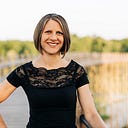“Sí es cierto lo que dices Melissa… yes, it’s certain what you say,” he says to me in a WhatsApp voice message, “The LGBTQ community is even more vulnerable [than other migrants].”
Pastor Samuel sighs with a weariness in his voice, messaging me from his home in Ciudad Juarez after a long day out in his truck bringing food and blankets to asylum-seekers.
Samuel and I met nearly two years ago when I went on a faith leader delegation trip to the border and I took an extra day to be able to see his church’s ministry to asylum-seekers. His small church, just on the other side of the border from El Paso, Texas, is appropriately named, Iglesia Frontera de Gracia — Border of Grace Church.
“People don’t tolerate them, they critique them,” he continues, speaking again of the LGBTQ community he’s met. “You know how this is. It’s true that the Church doesn’t view them well. But for me personally, in my heart, I support them;” he pauses to correct himself for saying the masculine form of “them” instead of the feminine, as he speaks about the group which includes Trans women.
“They were so happy and surprised to have met me,” he laughs, after clarifying that they’d contacted him once they’d been kicked out of a local shelter. “I said to them, ‘Come! Let’s take a photo together!’ One of them responded, ‘It’s not a problem, pastor?’ I told her, ‘Don’t worry, I have no problems with you. If people get upset with me for that — that is their problem.’”
“They are very vulnerable,” Pastor Samuel continues, as I look at the photos he sent me — faces of brave women from Honduras, Nicaragua, and El Salvador that found each other and stayed together on the journey for safety. “There are about 28 of them… and I hear 5 more are coming from Mexico City. So we continue to support them, giving them food, clothes, blankets.”
I thank him for the updates and ask him what he needs and how I can pray for them.
“Keep praying for us and the people that are very vulnerable out in the cold, on the street,” he answers. “The LGBTQ community has been marginalized, but we’ve been able to help them a little more. I don’t have much… I can’t help them with much because there are so many people, but the little I have is the little I can give them, so we will keep helping.” My breath catches in my throat at the simplicity and selflessness of these words.
“Please keep supporting us because we will keep helping anyone and everyone, because we all have dignity and are deserving of help. In my heart and mind, there is no barrier between the LG…” he stumbles over the acronym, acknowledging that he’s still learning, “the LGBTQ community and everyone else. There is no problem here. They are God’s creation and they need our help. I am at their service.”
I’ve sat with this story for some days now, thinking over what thesis statement to pull from the narrative to motivate others, tie it up conclusively, and send it out into the world. But these days, I don’t have that in me. So I’ll let these words speak for themselves, and let myself live into Pastor Samuel’s posture of radical yet simple hospitality: the little I have is the little I give.
If you would like to support Frontera de Gracia’s grassroots ministry of meeting the physical and spiritual needs of asylum-seekers in Ciudad Juarez, please consider donating here by following the prompts and selecting “other” for the fund and typing in “Frontera de Gracia” in the designation description.
For more stories and information from Pastor Samuel and Frontera de Gracia’s ministry, please read the following blogposts:
— Asylum-Seekers in El Paso, Texas
— Seeking Justice at the US Southern Border
